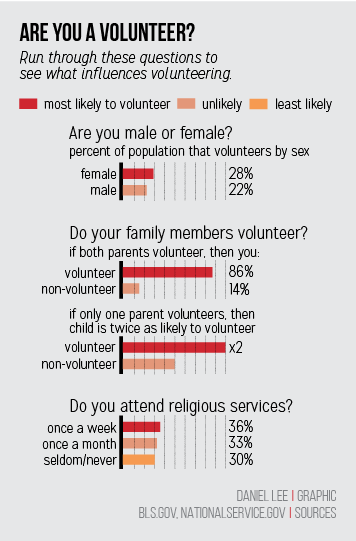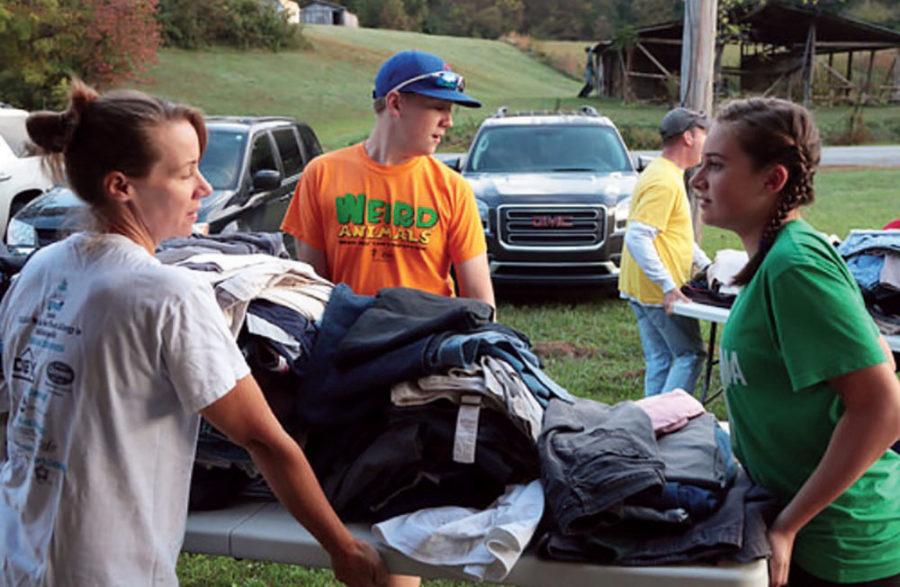While volunteering at the Carmel United Methodist Church food pantry, sophomore Jack Martin places another filled box of food donations on the metal rack. Martin said he hasn’t volunteered at the local food pantry for the last five years just for a college application resume booster. Rather, he said he volunteers to assist other individuals and experience viewpoints he would not be able to at home or in the classroom.
“With volunteering, you get to help people who you may not know, and it is a do-it-yourself experience which cannot be replicated in the classroom or at home,” Martin said.
Martin said along with volunteering for various organizations such as the Carmel United Methodist Church food pantry, he has attended the Corbin Kentucky Mission Trips for the past seven years.
“Last year on the Corbin Kentucky Mission Trip, myself and three other service members helped a family of four that were in poverty,” Martin said. “The two daughters of the family, who were of really young age, were so supportive along the way and what we did as a group was phenomenal because we did everything from rebuilding houses to serving meals. We even connected to the families personally.”
Unlike Martin, however, the majority of high school students live a less service-oriented lifestyle. According to a study conducted by Harvard University in 2016, 79 percent of high school students said they believe the importance of education is increasing at an exponential rate, in large part due to the rise in the competitiveness of college admissions, causing fewer students to volunteer so they can focus on their studies.
However, many recent studies indicate that actively participating in community service actually develops essential academic and career skills. In fact, a study conducted by the Pew Research Center in October 2017 indicates that people who participate in community service on at least a monthly basis are more likely to be in control of their education.
Martin said for him, the personal benefits to volunteering outweigh the academic ones.
Martin said, “Even though I know academics are becoming more and more competitive, the reason I go on this mission trip, as well as (volunteer locally), is because I wish to benefit people mentally and socially, (which also teaches) me many things that will benefit me in the classroom and in future years in college.”
Dalton Thompson, National Honor Society (NHS) president and senior, shares a similar view to Martin. He said people often neglect the duality of service and academics.
“There is so much emphasis on academics and athletic achievement that service can become an afterthought,” Thompson said.
Thompson said he sees the positive impact community service has on students’ lives, especially through NHS.
“Service endows people with a work ethic and skill set that will be useful throughout their life. These benefits will assuredly help the individual and reflect on them positively,” he said.
According to Thompson, community service teaches students to look past themselves and understand the positive role they can play in their community.
“High school students should choose (to participate in) community service that they feel truly sincere about,” Harry Pettibone, College and Career Resource Center counselor, said. “Doing so will lead to many more benefits in future years and in the classroom.”
According to a study by the University of Pennsylvania in 2016, 61 percent of “relatively dedicated” volunteers experienced psychological benefits like self-efficacy and learned new time management techniques.
“Students who volunteer will naturally gain a sense of satisfaction, which I have seen, and it is always better to be the giver of help,” Pettibone said.
Despite the increase in importance in academics, Pettibone said he has seen a growth in the number of service-oriented organizations at CHS in the seven years he has worked at this school.
“Finding your service-oriented passion at this school is easy because most CHS students learn as much inside the classroom as they do in clubs and organizations,” Pettibone said.
Thompson said clubs like Key Club and NHS that value service make a point of appreciating their members and reminding them of the significance of their service efforts.
Thompson said, “We do our best to make community service a way of changing lives and learning new skills.”
Martin said he recognized these social and academic-related benefits of community service at a young age.
“The first year I went on the mission trip to Kentucky, we were assisting families in poverty by building homes for them,” he said. “By the end of the trip, I experienced how our help enabled them to live a better life. That moment became engraved into my mind, which taught me initiative and communication skills.”
Pettibone said people need to put a focus on participating in community service, while still maintaining the importance of academics.
“Workplaces and colleges are trying to build their campus in a variety of ways, so community service will enhance an applicant holistically, beyond their academic achievements,” Pettibone said.
With his experience with community service, Thompson said he has seen the effects of community service on individuals, especially students.
“Positive service experiences and the skills learned will have a greater impact, and service experience is often indicative of effective students and leaders,” he said. “Service efforts may also resonate with future careers.”
Martin said community service has enabled him to gain understanding of different ways to approach his future in college and beyond.
“Service has enlightened me on differing viewpoints and lifestyles, which I otherwise wouldn’t experience in Carmel,” he said. “Service is something that must be done in your life and without it, you’ll never learn what helping others is.”




























![Keep the New Gloves: Fighter Safety Is Non-Negotiable [opinion]](https://hilite.org/wp-content/uploads/2024/12/ufcglovescolumncover-1200x471.png)
















































![Review: “We Live in Time” leaves you wanting more [MUSE]](https://hilite.org/wp-content/uploads/2024/12/IMG_6358.jpg)
![Review: The premise of "Culinary Class Wars" is refreshingly unique and deserving of more attention [MUSE]](https://hilite.org/wp-content/uploads/2024/12/MUSE-class-wars-cover-2.png)
![Introducing: "The Muses Who Stole Christmas," a collection of reviews for you to follow through winter [MUSE]](https://hilite.org/wp-content/uploads/2024/12/winter-muse-4.gif)
![Review: "Meet Me Next Christmas" is a cheesy and predictable watch, but it was worth every minute [MUSE]](https://hilite.org/wp-content/uploads/2024/11/AAAAQVfRG2gwEuLhXTGm3856HuX2MTNs31Ok7fGgIVCoZbyeugVs1F4DZs-DgP0XadTDrnXHlbQo4DerjRXand9H1JKPM06cENmLl2RsINud2DMqIHzpXFS2n4zOkL3dr5m5i0nIVb3Cu3ataT_W2zGeDAJNd_E-1200x884.jpg)
![Review: "Gilmore Girls", the perfect fall show [MUSE]](https://hilite.org/wp-content/uploads/2024/11/gilmore-girls.png)
![Review in Print: Maripaz Villar brings a delightfully unique style to the world of WEBTOON [MUSE]](https://hilite.org/wp-content/uploads/2023/12/maripazcover-1200x960.jpg)
![Review: “The Sword of Kaigen” is a masterpiece [MUSE]](https://hilite.org/wp-content/uploads/2023/11/Screenshot-2023-11-26-201051.png)
![Review: Gateron Oil Kings, great linear switches, okay price [MUSE]](https://hilite.org/wp-content/uploads/2023/11/Screenshot-2023-11-26-200553.png)
![Review: “A Haunting in Venice” is a significant improvement from other Agatha Christie adaptations [MUSE]](https://hilite.org/wp-content/uploads/2023/11/e7ee2938a6d422669771bce6d8088521.jpg)
![Review: A Thanksgiving story from elementary school, still just as interesting [MUSE]](https://hilite.org/wp-content/uploads/2023/11/Screenshot-2023-11-26-195514-987x1200.png)
![Review: "When I Fly Towards You", cute, uplifting youth drama [MUSE]](https://hilite.org/wp-content/uploads/2023/09/When-I-Fly-Towards-You-Chinese-drama.png)
![Postcards from Muse: Hawaii Travel Diary [MUSE]](https://hilite.org/wp-content/uploads/2023/09/My-project-1-1200x1200.jpg)
![Review: "Ladybug & Cat Noir: The Movie," departure from original show [MUSE]](https://hilite.org/wp-content/uploads/2023/09/Ladybug__Cat_Noir_-_The_Movie_poster.jpg)
![Review in Print: "Hidden Love" is the cute, uplifting drama everyone needs [MUSE]](https://hilite.org/wp-content/uploads/2023/09/hiddenlovecover-e1693597208225-1030x1200.png)
![Review in Print: "Heartstopper" is the heartwarming queer romance we all need [MUSE]](https://hilite.org/wp-content/uploads/2023/08/museheartstoppercover-1200x654.png)




